Implant prosthetics
ODENT Centre offers implant-supported restorations
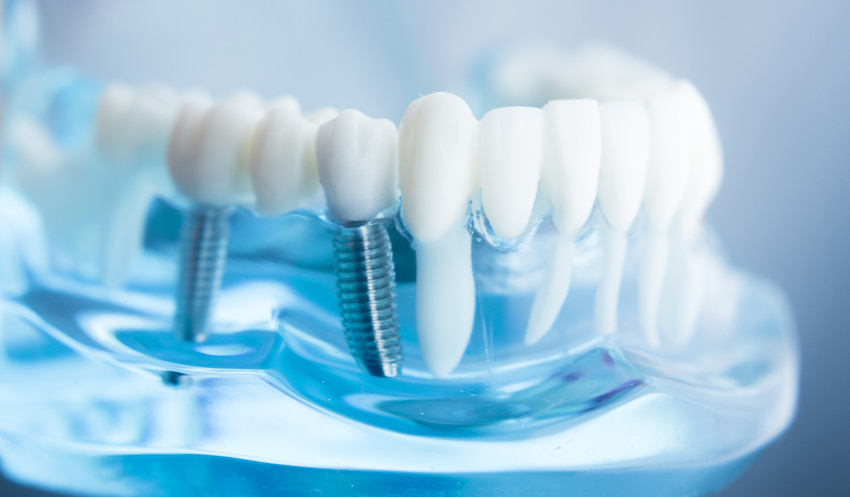
Implant prosthetics deals with implant-supported prosthetic restoration. Our restorations are tailored to suit patients’ individual needs.
Depending on the number of missing teeth, we are able to restore your natural dentition. In the case of a single tooth missing, it will be an implant-supported porcelain crown. If two or more teeth are missing, the restoration will consist of single crowns or a bridgework retained by two implants. In the case of a complete edentulism (tooth loss) in the maxilla or mandible, the doctor will place several implants to provide the foundation for the denture.
If you:

- complete tooth loss
- have missing teeth,
- missing tooth bud of a permanent tooth
- do not tolerate conventional dentures
- suffer from post-traumatic conditions involving the loss of permanent teeth
Implants are the best way to replace missing teeth. ODENT Warsaw – a specialist orthodontic and implantology clinic invites you to an implantology consultation, during which the doctor will propose the best implant treatment plan for you combined with modern prosthetics.
Treatment stages:
Diagnostics and planning of the treatment
Implant consultation – the doctor reviews your medical history, takes a panoramic radiograph or sends you to have a 3D tomography scan made. Based on the imaging, the doctor assesses the condition of your teeth and the amount of bone, as well as plans for the size of a potential implant. He or she presents the treatment plan and cost estimate to you.
Surgical stage
Implantation procedure Implantation – the implant is placed in the bone of the maxilla or mandible where a tooth is missing. The procedure is performed under local anaesthesia, with the use of a computer-controlled system the Wand, and takes about an hour. The gum over the spot of the implant placement is cut to uncover the bone. With the use of a specialist equipment, the bone is drilled to prepare it for the implant. Once the implant has been inserted, the gum is sutured. Sutures are taken off ca. 10-14 days after the surgery. The procedure is completely painless.
Bonding of the implant with the bone usually takes 3 to 6 months from the placement, then the surgeon uncovers the upper part of the implant and fits a healing cap which shapes the gum of the future tooth neck. If bone augmentation is necessary, e.g. a maxillary sinus lift, the process will take 6 to 9 months.
Prosthetic stage
A few days after the abutment has been fitted, a porcelain crown is attached to the implant. If a greater number of teeth is missing, a prosthetic restoration is produced, i.e. bridgework or dentures supported by several implants.
During the entire process, the patient avails of a temporary prosthetic restoration, imitating the missing teeth.
Implant-supported prosthetic restoration is a state-of-the-art solution, both in aesthetic and functional terms.
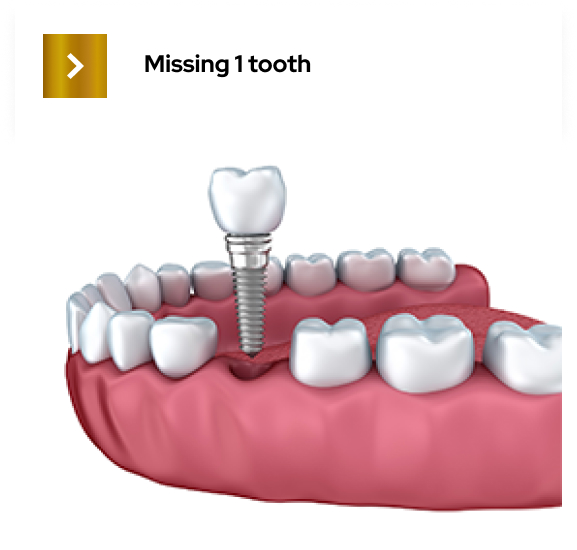
Prosthetic restoration supported by 1 implant
1 missing tooth.
Placement of one implant to which a prosthetic crown is fitted.
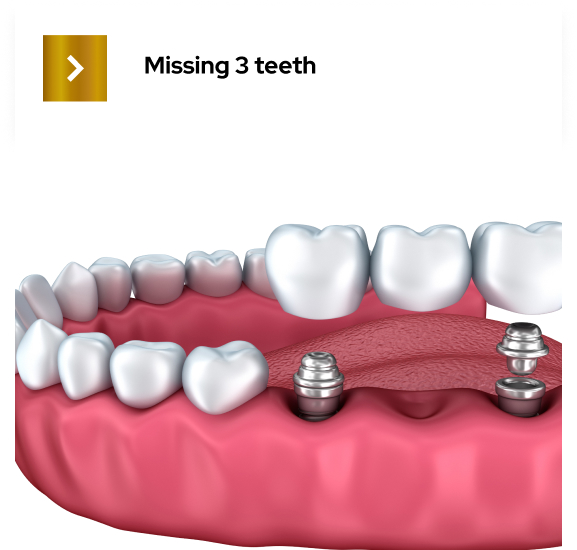
Prosthetic restoration supported by 2 implants
3 missing teeth.
Placement of two dental implants to which a prosthetic restoration of 3 dental crowns is fitted. It also possible to place three implants for three separate prosthetic crowns.
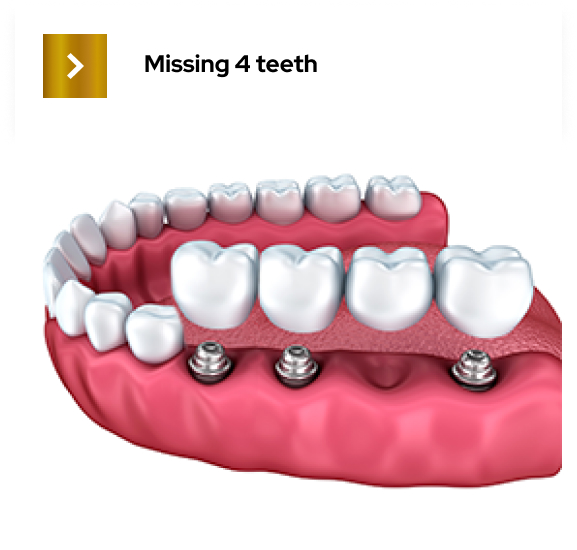
Prosthetic restoration supported by 3 implants
4 missing teeth.
Placement of three dental implants to which a prosthetic restoration of 4 dental crowns is fitted. It also possible to place four implants for four separate prosthetic crowns.
Instructions to follow after placement of a dental implant:
Complete loss of teeth
In the event of a complete loss of teeth in the maxilla or the mandible, a surgeon will place a greater number of dental implants:
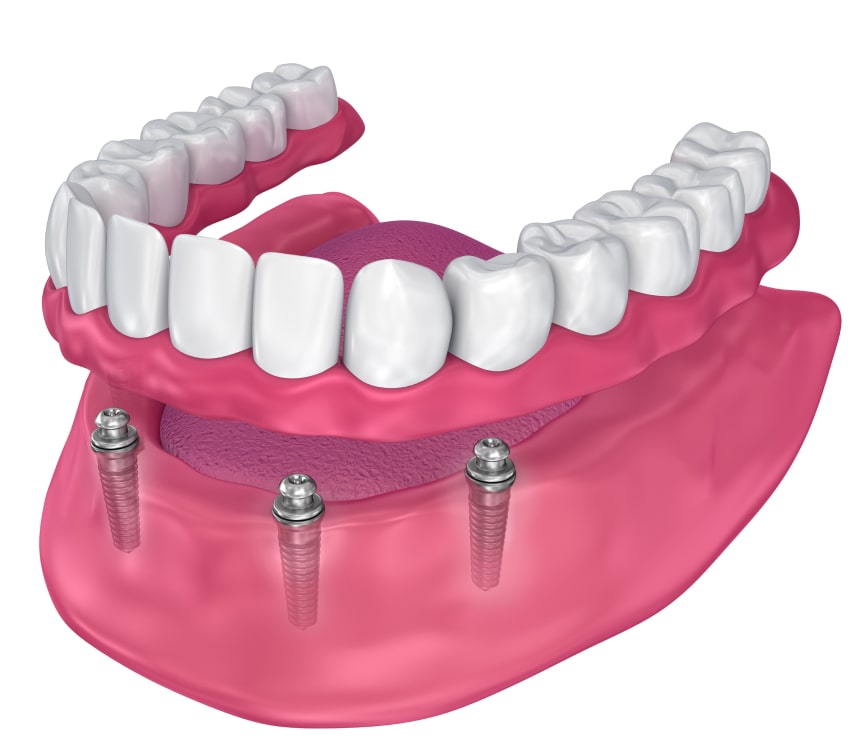
Minimum 6 in the maxilla and minimum 4 in the mandible.
The implants will provide a foundation for a permanent denture or bridgework, ensuring a 100% effect of natural teeth. Such a denture is permanently fixed and guarantees that a patient will feel as if having their own teeth, giving them a new quality of life!
In our Centre, we offer the following implant-supported prosthetic restorations to treat a complete loss of teeth:
- permanent bridgework fitted to implants
- dentures screwed to implants
We offer:
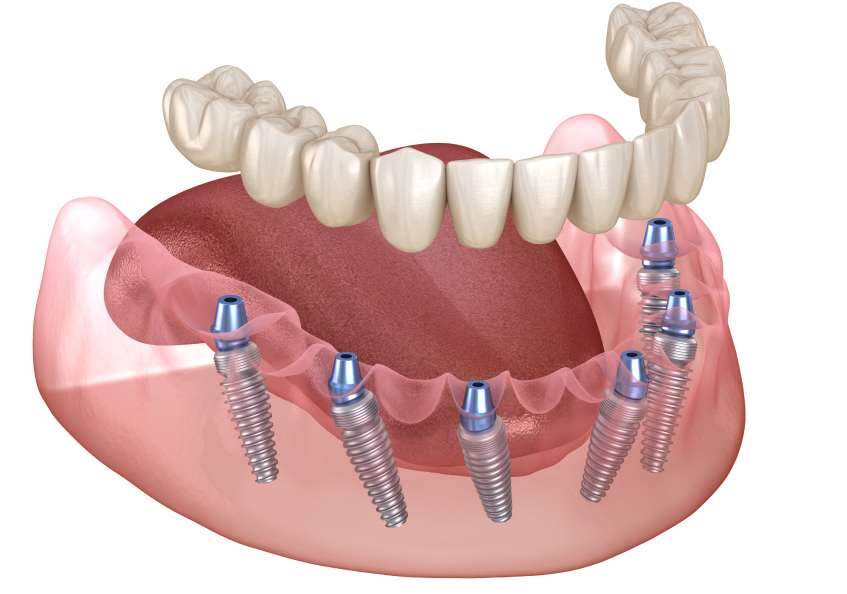
Prosthetic restoration supported by 8 implants – a complete loss of teeth in the maxilla.
Placement of eight dental implants to which a prosthetic restoration of crowns of the upper teeth is fitted.
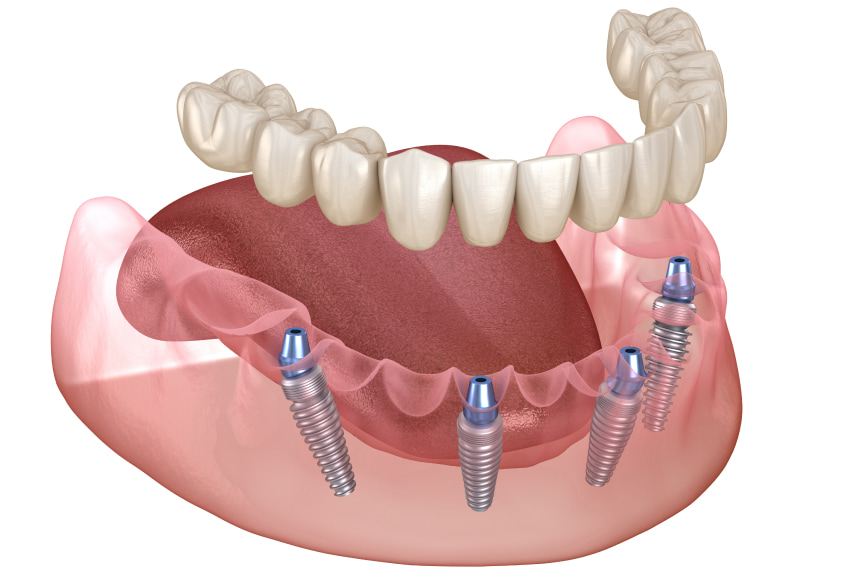
Prosthetic restoration supported by 6 implants – a complete loss of teeth in the mandible
Placement of eight dental implants to which a prosthetic restoration of crowns of the lower teeth is fitted.
Benefits of implant-supported prosthetic restoration:
Frequently asked questions
FAQ
1. Is the age a contraindication for placement of implants?
No. The age does not matter, the most important is the patient’s health condition. Diabetes, smoking, abuse of alcohol and poor oral hygiene negatively affect the healing process. Prior to the implant placement, the doctor reviews medical history of the patient, checks health condition and addresses all doubts. If any health issues are discovered, the doctor recommends additional tests to be made (e.g. CT scans, blood tests) and decides on further course of treatment based on their results.
2. What is an implant made of?
An implant is made of titanium, a biocompatible metal, well-tolerated by the human organism. Titanium is an alloy which does not cause allergies and binds with the maxillary or mandibular bones within a few months after placement.
3. What is an implant-supported crown made of?
In the ODENT Dental Centre in Warsaw we offer:
- porcelain crowns on metal base,
- all-porcelain crowns on zirconia base.
4. What is a dental implant?
A dental implant is a titanium screw placed by the doctor in the bone of the maxilla or mandible. The implant serves as the root of the tooth. A porcelain crown is fitted to a dental implant by means of an abutment. A dental implant with a porcelain crown mirror the structure of a natural tooth, i.e. the root and crown.
Our doctors

Once you have completed the form, we will respond within 60 minutes during clinic hours.
-
Opening hours
Mon-Fri: 8:00 - 21:00
Saturday: 8:00 - 15:00
-
st. Grzybowska 85
00-844 Warsaw





